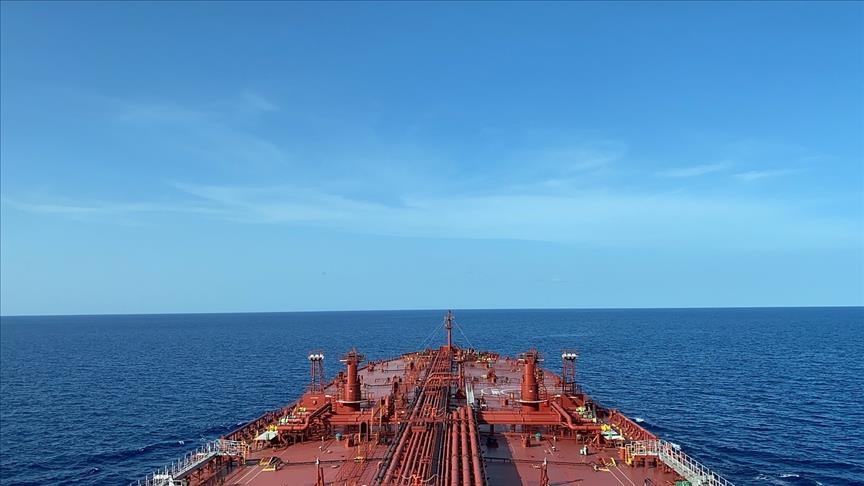Shipping firms stay cautious in Strait of Hormuz
Maersk, Hapag-Lloyd, Frontline confirm transits via Strait of Hormuz continue but they actively monitor security risks, while insurance costs rise

LONDON
Shipping firms are exercising caution in the Strait of Hormuz as they closely monitor the security risks in the region, while continuing operations in the narrow waterway connecting the Persian Gulf to the Gulf of Oman.
Experts say the possibility of the strait’s closure remains very low and shippers continue their transports with great caution, after Israel’s attacks on Iran and the US strikes on Iranian nuclear facilities.
Maj. Gen. Esmaeil Kowsari, a member of the parliament’s National Security Commission, said the Iranian Parliament decided to close the Strait of Hormuz after the US attacks on Iran but the final verdict is the Supreme National Security Council’s to make -- a highly unlikely possibility.
The ship traffic in the Strait of Hormuz over the weekend has been at its highest threat level in the last two decades, following the US attacks, according to the artificial intelligence (AI)-based maritime tracker Windward.
Some slight decrease in ship traffic has been seen in the Strait of Hormuz due to geopolitical uncertainties and security concerns, as some vessels made U-turns to avoid entering the waterway.
The increase in the automatic identification system (AIS) interferences also contributed to the risks in the Strait of Hormuz.
Some 23% of the commercial vessels operating in the Persian Gulf and passing through the Strait of Hormuz had navigation disruptions on Sunday.
Arne Lohmann Rasmussen, chief analyst and head of research at Denmark-based Global Risk Management, told Anadolu that a significant amount of GPS and AIS interference is observed, causing major concerns.
Rasmussen mentioned that a slight decrease in ship traffic was seen in the Strait of Hormuz but the drop was not dramatic.
“In my view, there’s a relatively low likelihood -- maybe 10-15% -- of a significant disruption, and a full physical blockade is highly unlikely,” he said. “However, Iran could opt for less direct tactics -- similar to how the (365bet�����������籭i) Houthis have disrupted Red Sea traffic -- by issuing threats or launching isolated missile attacks on commercial vessels.”
“Still, the chances of a large-scale escalation are slim because it would hurt Iran itself,” he noted. “It would strain relations with countries like China and Qatar -- some of the few that are not openly hostile to Iran.”
Rasmussen stated that a blockade on the Strait of Hormuz would strain Iran’s own oil exports and the imports of refined oil products, such as gasoline, diesel, and fuel oil.
“Therefore, closing the Strait would likely be a last resort move by Iran,” he said.
Rasmussen emphasized that the industry is on alert, monitoring the developments in the region.
“Yes, insurance premiums have increased, reflecting the heightened risk. But tanker rates are also up, which offsets those costs to some extent,” he said. “I believe shipping through the strait will continue, but with caution.”
Rasmussen noted that some shippers have confirmed that they will continue their operations in the Strait of Hormuz but they will have to reassess the situation in the event of missile strikes on ships.
He added that some tankers made U-turns to avoid entering the waterway over the weekend but still ended up heading back to the region, “indicating that they now consider security conditions acceptable enough to transit.”
Currently, the closure of the Strait of Hormuz remains not likely but major shippers are closely monitoring the security risks to pass through the waterway.
Danish shipper Maersk, the world’s largest container firm, said transporting through the Strait of Hormuz remains possible, while monitoring the situation closely.
“(We) have contingency plans in place should the situation change in the near future,” it said, according to an advisory note on Monday.
German container shipping firm Hapag-Lloyd said it is continuing operations in the Strait of Hormuz but the situation could change any time, while the Norwegian shipper Frontline said the rise in the interference with GPS systems required manual navigation in heavy traffic areas.
The British energy giant Shell said it is exercising caution when transiting via the Strait of Hormuz.
Strategic importance Strait of Hormuz
The narrow waterway between the Persian Gulf and the Gulf of Oman is a significant route for the global oil and liquefied natural gas (LNG) trade, especially for Middle Eastern oil, accounting for one-third of the world’s seaborne crude oil shipments and one-fifth of the world’s total oil consumption.
Through the Strait of Hormuz, most of the 20 million barrels of oil and petroleum products transported daily reach Asian markets, primarily China. A large part of Iranian oil is exported to China via the waterway.
Some 85% of Iraqi oil is transported through the Strait of Hormuz, while Saudi Arabia makes up 35% of the total oil transported via the waterway, followed by the United Arab Emirates with 20%, and Iraq with 27%.
Meanwhile, some 20% of the world’s LNG trade uses this waterway.
Anadolu Agency website contains only a portion of the news stories offered to subscribers in the AA News Broadcasting System (HAS), and in summarized form. Please contact us for subscription options.







